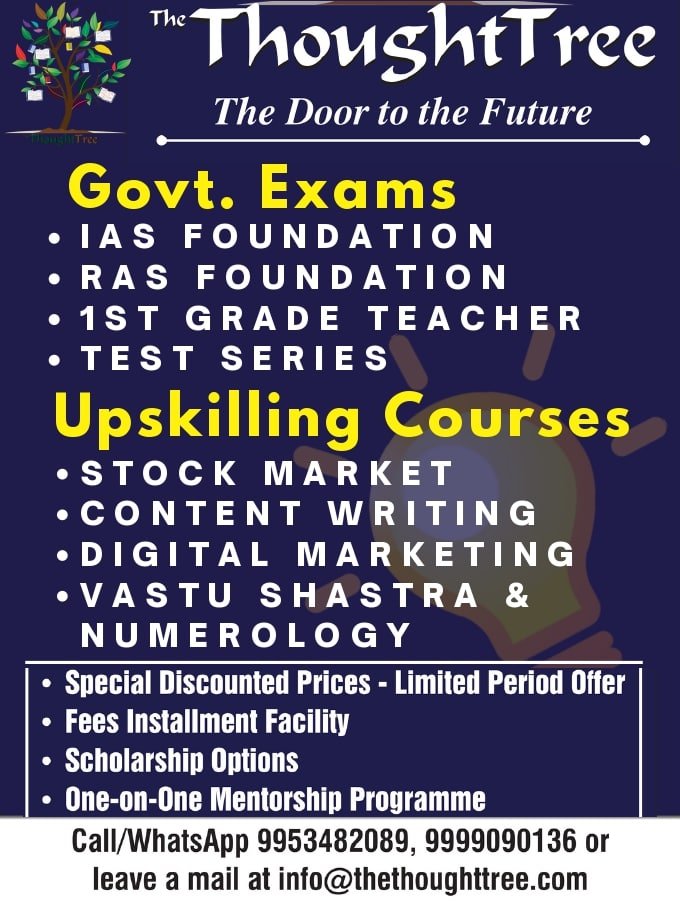There are numerous benefits of UPSC preparation. Aspirants for the UPSC Civil Services Exam must begin their preparations. As a result of learning and the information obtained, the individual will become a scholar, an analyst, and a learner who can see the big picture. An aspirant’s intellectual ability is favorably influenced, and they stand out from the crowd due to this voyage. Candidates for the civil service exam can absorb information in a new manner and analyze problems from many perspectives as they study for the exam.
In the end, it all boils down to how dedicated a candidate is to studying for the UPSC examination. Aspirants who study methodically and devote themselves entirely to the task have a fair chance of succeeding in the examination and serving the nation. Even if they fail to become government servants, the applicants would still positively impact society. They can help others because of their skills while studying for the examination. Both ways, you’ll come out ahead.
Before discussing the benefits of UPSC Preparation, if you are a UPSC aspirant, you can join The Thought Tree(T3). We at T3 provide mentorship, test series, special notes, and many more things to our students. We have the best faculty members who have years of experience, and we will guide you in the best possible way. All these features make us the best IAS coaching in Jaipur. Let’s come back to our topic.
[content_ias_cta]
There are numerous benefits of UPSC Preparation. Let’s see some of the best ones.
Benefits of UPSC Preparation
1. Discipline

“Life without discipline is like a ship without a radar,” as the saying goes. As part of their UPSC preparation, applicants learn life skills such as self-control and self-discipline. With the help of discipline, hopefuls learn how to live their life more successfully.
To be an IAS, you must have a strong sense of self-control and self-discipline. Discipline is the key to a successful career for every applicant, and it motivates one to push harder and attain the impossible every day. The urge to unwind and lead a regular life entirely vanishes, and the candidate must begin to lead an uncommon life to stand out from the crowd.
Making minor sacrifices now for a brighter tomorrow is possible when you live a disciplined life. Discipline leads to habits, which lead to routines and daily behaviors. “Today + Today + Today = Your Life,” says renowned life coach Brian Cain. To succeed in life, one must have a strong foundation of self-discipline. Self-discipline is essential because it prevents us from succumbing to our impulses and emotions.
Disciplined students are more interested in schoolwork than those who don’t adhere to it. They can make better-informed decisions about their education and professional path. This is among the biggest benefits of UPSC Preparation.
2. Other Jobs

Aspirants who prepare for the UPSC exam have access to various career options. There are advantages to students who are preparing for this exam over other government exams.
It also improves their ability to answer MCQ-based questions, common in MBA admissions tests. The pupils don’t even have to worry about whether or not they will pass. These examinations are simply a sliver of the whole UPSC examination.
To become a public servant in a particular state, one may apply for the State Civil Services Exams (State PCS). State PCS tests may be taken as many times as a person desires without regard to a person’s residency status. However, one must pass the State language test to be eligible for the grant. There are nine State PCS examinations for which candidates may sit if they are fluent in Hindi.
Candidates who fail to pass the interview stage (PSUs) might offer public sector jobs. International Financial Services Centre Authority (IFSC), a newly created agency, has accepted applications from those CSE entrants who were unable to make the final merit. In addition to government examinations, there are many occupations in public and private sectors for which you may apply and successfully pass.
Read More: Best UPSC Interview Tips
3. An Ocean of Knowledge

Since the applicants for the UPSC have to study books on every topic, they have a vast library of information at their command. Mains preparation requires a significant amount of reading and writing, and as a result, students accumulate a substantial amount of information.
It’s possible to learn a great deal about the world around you while studying for the UPSC examinations. A fresh outlook on life may be obtained by studying for the CSE exam, regardless of what career path you pick. In addition to your preparations for the civil service, applicants might think about possible fallback plans.
If you’re not selected for a career in the civil service, you’ll be put in a position that’s more suited to your abilities. Candidates should be prepared to seize this opportunity, and test preparation is one way to do so. So plunge right in and take pleasure in the preparation stage; you’ll grow into a more mature person as a result. This is again one of the important benefits of UPSC Preparation.
Our Honourable President Mr Ram Nath Kovind is the ideal model. Mr Kovind arrived in Delhi after completing his law degree from DAV College, Kanpur, to prepare for the civil service exams. He began practicing law instead of an alternative to the Indian Administrative Service (IAS), which he passed on his third try. As of right now, he serves as India’s 14th president.
4. Development of Interpersonal Skills

Strong communication techniques are an integral part of developing a strong personality. The good news is that they’re starting on a solid lexical footing with this.
Even if a student doesn’t meet their goals, no one can deny the value of effective communication. To get what they’ve always wanted, Interpersonal Skills allow individuals to stand out and seek for it.
Taking the time to prepare for the UPSC exam can help you put your thoughts in order, allowing you to see things more clearly, both emotionally and intellectually. Things may be made a lot easier and more pleasurable. There are a plethora of incorrect responses stored within the human brain. Although no answer is completely “wrong,” it may not be correct if employed in an improper context. It is possible to have a useful emotional response in some situations but not others.
Each of us relies on various mental programs to get by in life. Essentially, these programs are the subconscious patterns that guide our thoughts and actions. There are a lot of hidden programs. For example, when we speak, we are often unaware of the words we use and the structure of the sentences we are constructing. Most of the time, the words we utter are merely a result of our spontaneous utterances. Occasionally, our software fails to perform the way we want it to. Sometimes, the task at hand does not lend itself to one of our pre-existing applications. Then we may want to reprogramme our brains differently.
In the long run, studying for the UPSC examinations will help you get your career firmly on track. Improve your interpersonal abilities by learning how to organize and cleanse your mind.
Read More: Tips to Read Newspaper for UPSC
5. Time Management

Effective time management is making the most of every minute of every day. You can get much more out of your schedule by employing certain strategies. According to Frederick Taylor’s idea of Scientific Management, efficiency may be improved by following a certain set of procedures. While preparing for the UPSC civil service exams, this can also be used.
The first step in preparing for the UPSC exam is to create a study timetable. It’s important to keep track of both your daily and monthly tasks. Include your routine in your daily planner. Try to start the day earlier. An alarm clock might help you get into the habit of getting up early if you’re not used to it. That IAS dream of yours might be put on hold if you turn off your alarm clock and then go back to sleep. Procrastinators will not be able to achieve this aim. Assign a certain amount of time to each of your activities and refrain from spending more time than necessary on any one of them.
When you’re studying for the UPSC examination, you’ll learn to set aside time each day for the essential things to you, and you’ll get a better sense of what you need to get done and how long it will take. With a calendar in place, you’ll spend much less time contemplating what to focus on and more time trying to get down to the vital tasks that need to be completed. You could use time management to focus on the most important activities at hand and reduce time-consuming interruptions. Let’s move to our another benefit of UPSC Preparation.
6. Inculcate Reading and Writing Skills

There is no substitute for reading and writing; they are inseparable components of a well-rounded education. They are talents that are continually honed thanks to small, unnoticed factors. There is always a way to boost your school performance, whether from a book or a poem.
As we all know, the UPSC exam requires a lot of reading due to its dynamic scope. If you want to be well-prepared for the UPSC, you should study a wide range of material, including reading newspaper editorials, informative novels, and films on current events. Writing your thoughts down using a pen and paper is another option. Due to the way exams are conducted, make sure that you write your notes on unruled paper since that’s what you will be given on the exam. And without practice, writing on a single line is pretty tough.
Reading will become a habit for you over time. In addition to promoting mental growth, reading is known to engage the muscles of the eyes, and it is an activity that requires higher focus and enhances a person’s ability to converse with others. The practice of reading also enables readers to convert phrases and sentences that they come across in ordinary interactions. As a result, we’re better able to keep up with both present and historical literature, and we’re more aware of world challenges. Individuals’ imaginative faculties improve as a result.
Read More: How to Prepare Current Affairs for UPSC?
7. Boosts Self-Confidence

One of the most important aspects of preparing for the UPSC is building self-confidence. Now that you’ve passed the preliminary and major examinations, the focus shifts to the interview portion of the process. Interviews are conducted one-on-one; thus, the only thing candidates can do is present themselves with confidence to the interviewer. Others who perform well will be placed, while those who do not will have a better future.
The final hurdle is the interview, even if you’ve nailed the preliminary and main rounds. This is where the candidate and the interview panel meet face-to-face. How do you handle this? The only way out is to build your self-esteem and confidence. After the Mains, candidates focus only on developing their personalities. This boosts their total sense of self-worth, demanding respect and admiration from others. However, it is only passed by a small percentage of applicants. The rest of the people will have a better life in the future.
When preparing for the IAS, confidence doesn’t arrive in a single day. Most IAS applicants begin their preparation for the test with a degree of trepidation and apprehension. This happens all the time. In the beginning, you will lack confidence, but as time passes and your knowledge base expands, your confidence will grow. Your self-assurance rises as a result of this. Nevertheless, such self-assurance is based on exam preparation. To succeed in life, you must constantly trust yourself and believe in your abilities. Never doubt your abilities.
Conclusion
A candidate’s journey to becoming a civil servant can be challenging but there are many benefits of UPSC Preparation. UPSC is not simply an exam; it’s a journey worth embarking on, and candidates should grasp this concept. A journey full of challenges and stumbling blocks leads to a final reward of happiness, much like in an adventure.
Aspirants should prepare for the UPSC examination. There are numerous benefits of UPSC Preparation. As a result of learning and the information obtained, the individual will become a thinker, an analyst, and a scholar who can see the big picture. In this fortunate voyage, an aspirant’s intellectual capacity is pleasantly influenced, but they stand out in a crowd. Those who study for the civil service exam get the ability to assimilate information in a novel way, allowing them to examine situations from a variety of perspectives.
Everything hinges on an aspirant’s level of dedication to studying for the UPSC test. There is a very strong possibility that you will pass the test if you prepare for it systematically, putting all of your heart and soul into it. You can join The Thought Tree. We provide UPSC coaching and help students fulfill their dreams.





